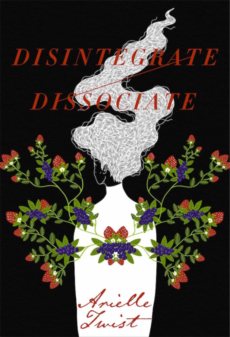
Most poetry book launches, in my experience, are serious, courtly, murmuring affairs: kind words of introduction, soft applause, hums of contemplation and approval. Solitary reactions occurring simultaneously; subtle, even-tempered responses to subtle, even-tempered books.
Enter Arielle Twist. Enter her ecstatic, surprising, jubilant family, friends, and fans.
Twist launched her debut collection of poetry, Disintegrate/Dissociate (Arsenal Pulp, 2019), on a wintry Saturday night at the Khyber Arts Centre in Kjipuktuk (Halifax), unceded Mi’kmaq territory where Twist currently lives. The small community venue was packed to the rafters and vibrating with anticipation—for a poet! For poetry!
Twist’s sibling, the evening’s emcee, lobbed proud and loving barbs at their sister before introducing two other local writers, Francesca Ekwuyasi and Bria Miller, who shared short fiction and poetry. Then came Arielle Twist herself: tall, poised, and glamourous, with a dark waterfall of hair that echoes the cultural mythos of her beautiful name—a striking contrast with the directness and sharp economy of her work.
Of the thirty-eight poems in Disintegrate/Dissociate, Twist took her time prefacing and exploring eight pieces with her audience while a snow storm gained momentum outside. She opened with her book’s “Prelude,” in memory of her late grandmother, her kokum. “The structure, on fire” (8) singes the edges of each page in Disintegrate/Dissociate—and sets a baseline of pain, resilience, and reverberation.
Twist continued with “Vacant,” a meditation on gender dysphoria that scatters traces of internal conflict, “breakdown, undone” (9), across the page. As in Vivek Shraya’s Even This Page is White (Arsenal Pulp, 2016), English-language formatting rules stand in here for white cultural imperialism—the impossible strictures of the western gender binary in particular.
I was especially glad to hear Twist read “Chords,” an exercise in quiet longing that, until that moment, I didn’t realize I needed to hear aloud. This compact poem begins with whales singing off Halifax Harbour, then expands its scope to include subtle yearning for Twist’s ancestral home: “the prairies sing too” (17).
I had hoped to see Twist perform “The Girls”; it anchors the book even while it “spit[s] fire” (2) and explodes like a naval mine filled with everything that her more economical poems sometimes leave me wanting. But I understand why she chose not to read it. “The Girls” is long, infuriating, sad, and brimming with explicit images and descriptions of “the kind of girl you jerk off to” (9) and of “bars where only rats will see her beauty” (28).
After Twist’s reading came thunderous applause, and then the low-key thunder of chairs being dragged out of the way. The night’s festivities would end with a dance party, not the usual book signing line, but I decided to face the snow earlier rather than later. I closed the door to the Khyber and stepped out into the cold just as the music started.
In her launch party, as in her book, Arielle takes what she enjoys or finds useful from Anglo conventions, shapes it to suit her artistic needs, her history, her traditions, and her lived experience. And as for the rest—the imperial, the racist, the transmisogynistic? The rest be damned; dance on its ashes.

